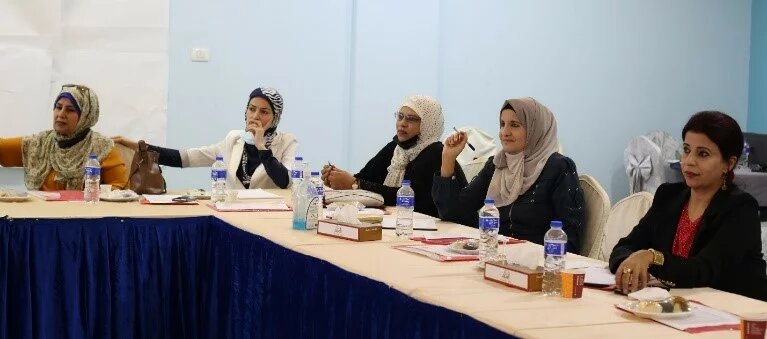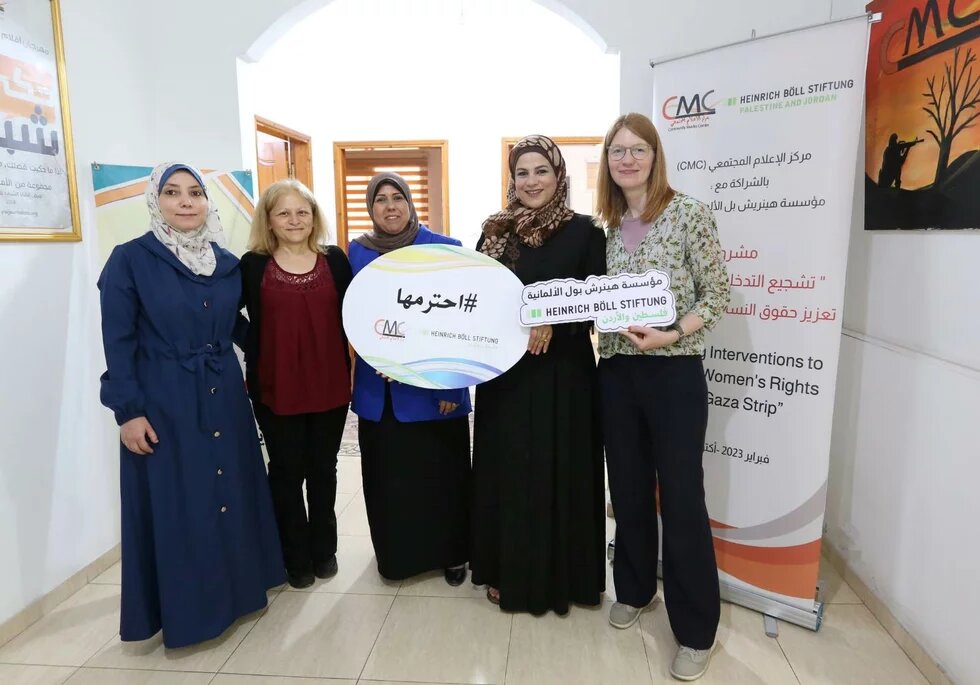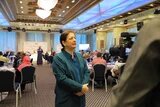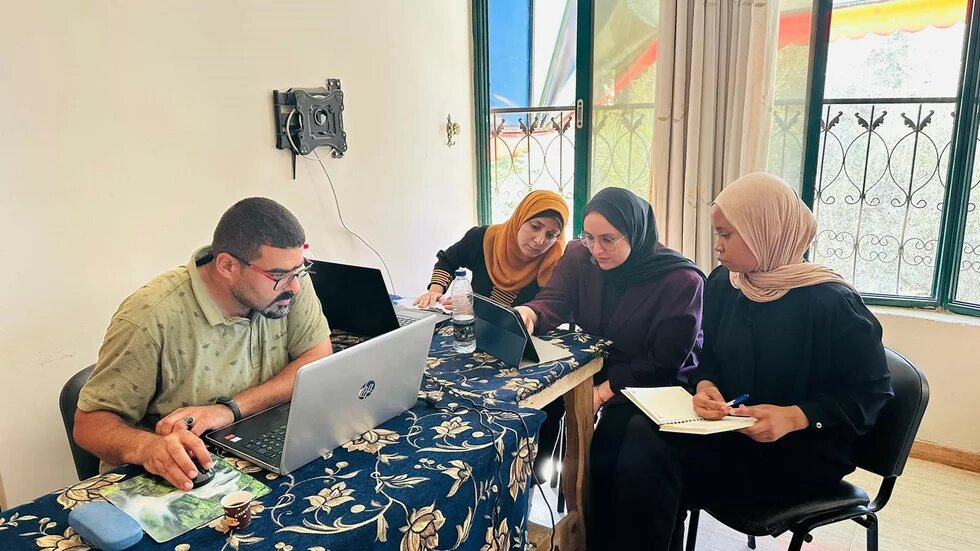
By: Dr. Riham Halaseh, Head of the Democracy and Human Rights Program, hbs Palestine and Jordan
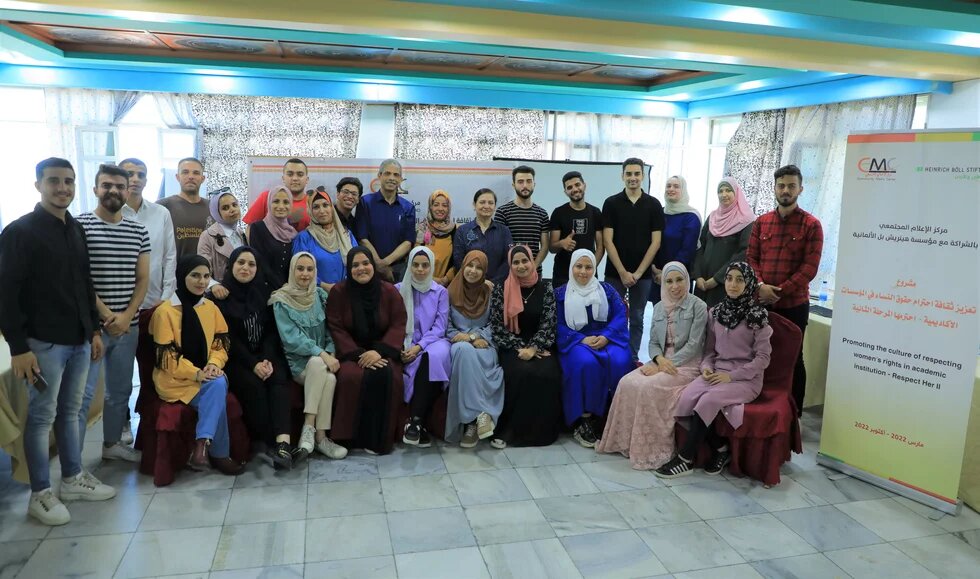
After nine months of the devastating war on the Gaza Strip, unprecedented in the scale of death and destruction, Palestinian civil society organizations defy incomprehensible challenges to provide much needed support by shifting their programs to deliver emergency relief, essential food and protection-related services. hbs’ partner organization, the Community Development and Media Center (CDMC), continues to work tirelessly despite all odds to support women and youth on the ground. Andaleeb Adwan, Director of CDMC, spoke to Dr. Riham Halaseh about the current situation in the Gaza Strip, the conditions that women are living through and the work of CDMC under these dire and challenging circumstances.
The ongoing Israeli war on the Gaza Strip has resulted in countless casualties and widespread destruction. According to the United Nations Office for the Coordination of Humanitarian Affairs (OCHA), as of 03 July 2024, the systematic Israeli bombing of civilian areas has led to the killing of over 37,000 civilians, along with over 87,000 total injuries. Palestinian sources report that 15,821 children and 10,472 women were among the civilians killed. Additionally, more than 10,000 persons are reported missing or under the rubble. The UN estimates that there are 1.9 million internally displaced persons (90% of Gaza), living amid inhumane conditions and lack of the minimum requirements of life, with 495,000 Palestinians facing catastrophic levels of food insecurity (OCHA). Additionally, UNICEF estimates that over 1 million children in need of mental health and psychosocial support, with 17,000 being unaccompanied or separated.
After 271 days of the devastating war on the Gaza Strip, Palestinian women and girls are still subjected to systematic violations to their rights in light of a brutal aggression, an illegal siege, and the lack of the minimum requirements for a decent life. According to the latest reports of UNWOMEN, 80% of women in the Gaza Strip now depend on food assistance to survive, with 83.5% reporting that the assistance they received was insufficient to meet their basic family needs.[1]
Women-led organizations are operating in dangerous areas in the Gaza Strip and under challenging and difficult circumstances. Despite being severely impacted by the war, these organizations are committed to their communities and continue to function, providing essential services, and are at the forefront of the humanitarian response. One of these organizations is the Community Development and Media Center (CDMC), which has been working in the Gaza Strip since 2007.
Since 7 October 2023, the Gaza Strip has been witnessing a devastating war with an unprecedented loss of lives, suffering, and destruction. Can you tell us in brief about the current situation there and its impact on women in particular?
Since October 7, 2023, the Gaza Strip has been engulfed in a devastating war, resulting in unprecedented loss of lives and widespread suffering. Women, along with men, children, and the elderly, face severe human rights abuses, including intimidation, persecution, and forced displacement. The continuous violence has led to daily civilian casualties, severe injuries, and widespread starvation, with women and children bearing the brunt of these horrors. They live in dire conditions in makeshift shelters, lacking basic necessities such as food, water, and healthcare, especially for pregnant women and new mothers. The psychological toll on women is immense, as they endure heightened stress and anxiety while caring for their families under these harsh conditions.
The ongoing war has displaced many, with women and children making up the majority of the displaced population. This increases their vulnerability to exploitation and abuse. The destruction of businesses and loss of employment further restrict economic opportunities for women, driving many into deeper poverty. The breakdown of community structures and social support networks leaves women more isolated and without usual support systems. Overcrowding in shelters leads to a lack of privacy, imposing immense psychological and health pressures on women. The destruction of healthcare infrastructure has led to severe malnutrition and a decline in physical and mental health, with many women and children at risk of deadly infections and epidemics. Reproductive health is in crisis, with significant challenges for pregnant women and new mothers due to inadequate medical care and severe shortages of supplies.
CDMC’s staff has been forcibly internally displaced across the Gaza Strip as a result of the continuous Israeli bombardment. Are you in contact with your team? How are they coping?
The team of CDMC is enduring difficult conditions along with their families, living a life of displacement and homelessness. They are moving from house to house and area to area under the threat of bombings, snipers, and drone attacks. They have also faced starvation, forced to eat animal feed, grass, and drink contaminated water.
Despite these hardships, CDMC continues its work and is overcoming the challenges faced. Our team communicates internally via social media on a daily basis, whenever possible, and carries out tasks from their homes or local areas. These tasks include participating in sectoral NGO meetings with representatives of international organizations, contributing to media production and documentation (both visual and written), preparing reports, coordinating films, and distributing aid in collaboration with other local organizations. In doing so, CDMC prioritizes the safety of its team, ensuring they are not exposed to unnecessary risks.
How does CDMC deal with the current situation on the ground considering the unprecedented humanitarian catastrophe? How was the work of the organization affected since 7 October?
Regarding our office and its contents, including furniture, equipment, and financial and administrative files, we have learned that the building housing our office along with offices of other NGOs, suffered significant damage during the Israeli army's invasions of Al-Shifa Hospital in November 2023 and the areas in western and central Gaza City.
One of our main activities is media documentation, including written and video stories about the lives of Palestinians in the Gaza Strip, especially women and children. We are also producing five documentary films about women community activists and their efforts to alleviate the suffering caused by displacement during the ongoing war. Additionally, CDMC is running an online advocacy campaign featuring various forms of digital content to call for an end to the war, provide relief to Gazans, and address the needs of women and other marginalized groups. I am in daily contact with the team, following up with them as they continue to work with the people on the ground, documenting activities carried out by CDMC.
The war is still ongoing, over 80% of Gazans are forcibly displaced to over-crowded makeshift shelters. What about your target groups, such as the youth activists and the members of the Palestinian Female Academic Commission? Are you in contact with them?
CDMC communicates with its target groups in the same way it does internally, by updating their information and staying in touch via social media. The project coordinator has prepared an updated list of the female academics, members of the Palestinian Female Academic Commission (PFAC), and their new places of displacement, as well as for the youth activists who participated in projects funded by the Heinrich Boell Foundation – Palestine and Jordan Office, over the past four years. Through this partnership, we were able to create the “Youth Ambassadors for Women’s Rights”. These groups of male and female youth activists and aspiring young leaders are empowered through capacity building, enhanced knowledge and experience exchange to become defenders of women’s rights and active members in their communities. Also, through the partnership with hbs Palestine and Jordan, we established the “Palestinian Female Academic Commission (PFAC)” which is a network of over 110 female academics working in various academic institutions (colleges and universities) across the Gaza Strip. CDMC works on empowering these female academics, through building their capacities and skills, to enable them to identify gaps and develop strategies for a change that contributes to eliminating manifestations of gender-based discrimination, exclusion and marginalization in academic institutions in the Gaza Strip. Unfortunately, we discovered that some of the youth activists and the female academics were killed by the Israeli bombardment, others have left the Gaza Strip, and the rest are displaced across the Gaza Strip.
You have been working in the Gaza Strip since 2007, focusing on promoting women’s rights and combating gender-based violence. Kindly brief us on the situation of women in the Gaza Strip in terms of challenges, achievements and opportunities?
The Gaza Strip has long been influenced by a patriarchal culture that restricts women's roles and participation based solely on gender. This has created barriers to women's involvement in sustainable development, impeding their decision-making abilities, economic autonomy, and chances for leadership positions. Consequently, women are often compelled to adhere to predetermined roles and work within these limitations. Cultural, religious, and societal norms dictate gender roles. Despite advancements in women's education and workforce engagement, women face limited career progression and bear disproportionate household responsibilities. Only 14% of women hold senior roles, and the unemployment rate for women is 72.2%. Women in the Gaza Strip encounter restricted access to healthcare and education, and are vulnerable to gender-based violence, exacerbated by the Israeli siege and the imposed restrictions on the movement of goods, especially those that profoundly impact the overall well-being of women. Women journalists for example, face challenging conditions due to political divisions, gender biases, and traditional norms. Also, women are susceptible to domestic and widespread conflict-related violence, with insufficient social and legal support systems. These challenges violate women’s rights, endangering their lives, depriving them of their right to live with dignity and comfort and diminishing their quality of life.
Despite these challenges, there have been significant achievements. Palestinian women have achieved high levels of education, with enrollment rates surpassing men in some areas. Many women are actively engaged in civil society, championing rights and participating in social and political activism. Increasing numbers of women are establishing small businesses with support from Palestinian NGOs and various programs fostering entrepreneurship. Moreover, and as a result of years of targeting local media outlets and practitioners, in terms of awareness raising and capacity building to address topics from a rights and gender perspective, local media is committed to gender-sensitive journalism, raising awareness and challenging harmful gender stereotypes.
There are also opportunities for improvement. Numerous local and international NGOs are committed to empowering women politically, socially, legally and economically through educational and awareness programs, training programs, the provision of legal and psychosocial support services, financial assistance, and advocacy work that targets decision-makers and the local community to sensitize them towards women’s rights. Continuous investment in education and vocational training, tailored specifically for women, can improve their employment prospects. Strategies and initiatives at the national and local levels are being implemented to address human rights and women’s rights in the Gaza Strip.
How do you see the future perspective for CDMC’s work in Gaza, considering all the achievements you accomplished over the past several years?
Despite the many challenges we are facing in light of the ongoing war on the Gaza Strip and its catastrophic consequences, I think the future of CDMC’s work in Gaza holds promising prospects, building on the significant achievements accomplished over the past several years. Focusing on Mental Health and Psycho-Social Support (MHPSS) services in the coming period is a priority for CDMC, as these services are vital for both the team members and the target groups. Acknowledging the traumatic experiences faced by the residents of the Gaza Strip, upcoming projects will increasingly concentrate on mental health and psychosocial support and will adopt creative methods to mitigate the psychological effects of the war. While this ongoing war has been traumatizing for all of us, all the team members have an excellent ability to adapt, which is essential for enhancing our resilience, and maintaining and developing our efforts in the future.
It is worth mentioning that CDMC developed its digital engagement to sustain communication and carry out projects even in restrictive conditions. This is expected to continue, facilitating wider outreach, more engaging interactions with our target groups, and amplifying the voices of the marginalized groups, especially women and youth, and to develop the work on human rights and social justice more effectively. Finally, CDMC is working to expand its international cooperation spectrum, through reinforcing current partnerships, and establishing new ones, which will support our efforts and strengthen our resources to enhance the capacity and potential of the team and the target groups towards sustainable development.
__________________________________________________________________________________________
About Community Development and Media Center (CDMC)
CDMC is an independent, non-profit, civil society organization, seeking to develop a sustainable media approach that sheds light on societal issues, promotes the values of democracy, equality, and a culture of human rights, and gives priority to women and youth issues. It adopts a human rights-based approach to empower marginalized groups, especially women, youth and journalists, to amplify their voices and enhance their practice of active citizenship with a vision of effective and influential Palestinian developmental media that advocates for human rights, rule of law, democracy and citizenship. CDMC seeks to develop the awareness and capabilities of women and youth, provide them with knowledge and skills about human rights to document the violations committed against them, and employ the media to defend their rights and achieve the desired social justice.
